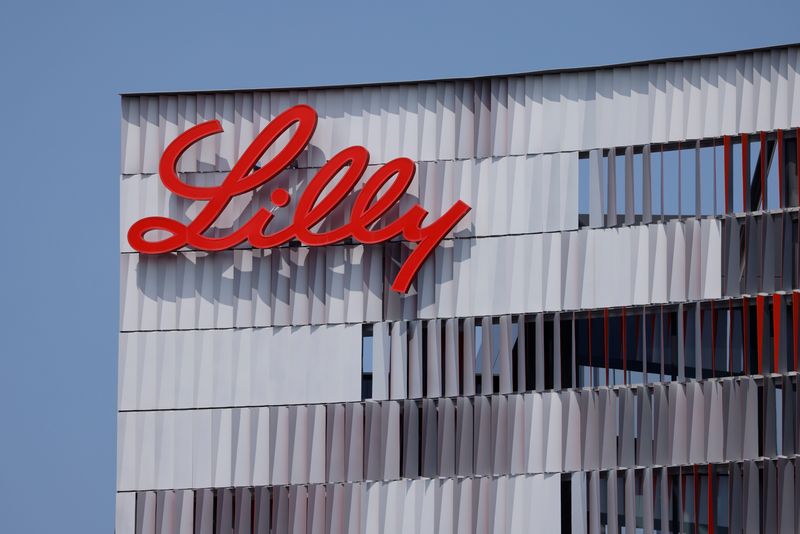By Bhanvi Satija and Patrick Wingrove
(Reuters) -Explosive demand and increased manufacturing capacity for Eli Lilly (NYSE:LLY)'s weight-loss drug Zepbound drove the company to raise its annual sales forecast by $2 billion on Tuesday, lifting its shares nearly 5%.
Lilly said it expects significant production increases in the second half of the year for its obesity treatment and related diabetes drug Mounjaro, for which most doses are in shortage due to high demand.
Skyrocketing demand for Mounjaro and Zepbound, both chemically known as tirzepatide, has propelled the Indianapolis-based drugmaker's market value above $700 billion - surpassing that of Tesla (NASDAQ:TSLA) and Walmart (NYSE:WMT).
The company said sales growth will depend on how much of the medicines it can produce and ship in the short to mid-term.
"We have sites working 24/7. We're doing construction overnight," Chief Financial Officer Anat Ashkenazi said on an investor call.
She added that approval of Lilly's multi-dose Kwikpen for Mounjaro in Europe came in slightly ahead of the company's expectations, giving it additional confidence in its ability to launch there.
Mounjaro is approved for both diabetes and weight loss in Europe.
The drugmaker has six manufacturing sites for the medicines. Lilly said it has broken ground at its $2.5 billion manufacturing site in Germany, and expects its Concord, North Carolina site to begin producing Zepbound and Mounjaro as early as the end of the year.
Lilly last week said it would acquire a manufacturing facility from privately-held Nexus Pharmaceuticals to produce injectable medicines. Production at its seventh facility in Wisconsin is planned to begin at the end of 2025.
"While there's still some capacity left to be built to meet that demand, they're further along in making that progress than we thought and that was a welcome surprise," said Edward Jones analyst John Boylan.
Ashkenazi added that despite the company's efforts, demand for the treatments will outpace supply through this year and potentially next year.
'A LOT OF DEMAND'
The U.S. Food and Drug Administration has said most doses of Zepbound and Mounjaro are expected to be in shortage through the second quarter of this year.
Eli Lilly and Danish rival Novo Nordisk (NYSE:NVO) are racing to increase production in a weight-loss market estimated to reach at least $100 billion by decade's end. Both companies' obesity treatments belong to a class of drugs originally developed for diabetes known as GLP-1 agonists.
GLP-1 drugs have been shown to help patients lose on average as much as 20% of their weight, fueling unparalleled demand.
"There's a lot of demand for these ... therapies, and I would say Lilly's doing a good job in trying to address the situation," said Tema ETF investment partner David Song.
Lilly and Novo are also working to provide clinical evidence that their GLP-1 drugs have medical benefits beyond diabetes and weight loss, such as heart protective properties that could broaden insurance coverage.
A Lilly executive on the call said the company expects Zepbound to be covered for patients insured under the U.S. Medicare program once it is approved for obstructive sleep apnea, following April's positive late-stage data.
Zepbound brought in first-quarter sales of $517.4 million, ahead of analysts' expectations of $418.20 million, according to LSEG data.
Sales of Mounjaro jumped to $1.81 billion from $568.5 million last year, but still below Wall Street estimates of $2.08 billion, which analysts attributed to limited supply.
Despite a strong start, total prescriptions of Lilly's Zepbound are falling behind those of Novo's popular weight-loss drug Wegovy.
In the United States, an average of nearly 63,000 Zepbound prescriptions have been written each week in 2024 as of April 19, compared to 110,000 for Wegovy, according to IQVIA data seen by Reuters.
That amounts to a total of more than 1 million Zepbound prescriptions, and around 1.75 million for Wegovy, written in the United States since the start of 2024.
Eli Lilly raised both ends of its 2024 revenue forecast by $2 billion and now expects $42.4 billion to $43.6 billion for the year. The drugmaker also raised its annual profit forecast by $1.30 per share to $13.50 to $14 per share.
The company reported an adjusted profit of $2.58 per share, topping analysts' expectations by 12 cents.
Lilly shares, which were up 26% so far this year, jumped another 4.6% to $771.44.
